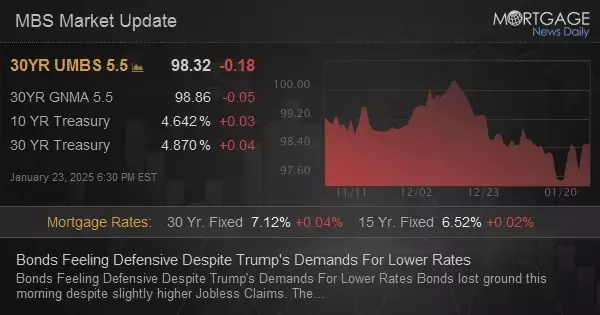
In a recent development, the bond market has displayed a defensive stance despite President Trump's calls for lower interest rates during his speech at Davos. The market's cautious behavior is influenced by concerns over potential fiscal changes and their impact on inflation and growth. While some analysts believe tariffs could lead to increased inflation, others think separate policies might boost economic growth or reduce revenue. Neither scenario is favorable for interest rates. Although 2-year Treasury yields did drop slightly following Trump's comments, this change was not significant enough to indicate a major market reaction.
Market Dynamics and Economic Indicators
In the early hours of Thursday, January 23, 2025, the bond market experienced slight losses despite higher-than-expected jobless claims. The number of new jobless claims came in at 223,000, slightly above the forecast of 220,000 and the previous figure of 217,000. Continued claims also exceeded expectations, reaching 1,899,000 compared to the projected 1,860,000 and the prior 1,853,000. Throughout the day, mortgage-backed securities (MBS) showed weakness, dropping by up to six ticks (.19), while the 10-year Treasury yield fluctuated between 4.469% and 4.645%, increasing by 3.3 to 3.7 basis points.
From the opening bell, MBS were marginally weaker, with little change after the release of economic data. By mid-morning, additional weakness was observed, but the market remained largely sideways for the rest of the day. This cautious trading pattern suggests that investors are bracing for potential shifts in fiscal policy and its broader implications on the economy.
As the day progressed, market participants continued to monitor key indicators closely. Despite the minor fluctuations, the overall sentiment remained guarded, reflecting a balance between the desire for lower rates and the uncertainty surrounding economic policies.
The bond market's defensive posture highlights the delicate interplay between political rhetoric and economic realities. Investors are clearly weighing the potential risks and benefits of proposed fiscal changes, leading to a cautious approach in trading activities. This caution is likely to persist as more information becomes available about the direction of economic policies.
From a journalist's perspective, this situation underscores the importance of staying informed and adaptable in an ever-changing financial landscape. The bond market's response to external pressures serves as a reminder that economic decisions can have far-reaching consequences, influencing everything from interest rates to investment strategies. As we move forward, it will be crucial to monitor how these developments unfold and their long-term impact on the global economy.
